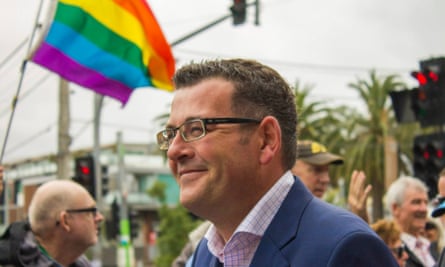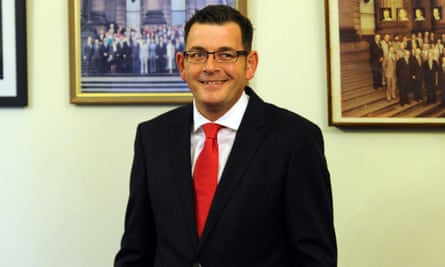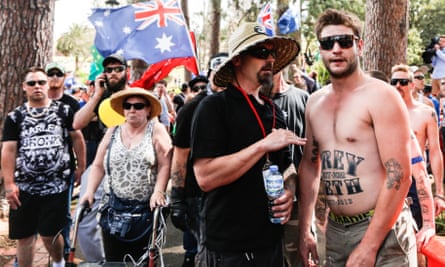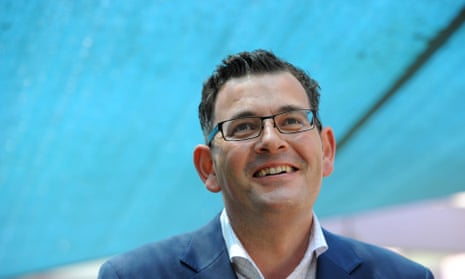Australia’s most well-known and popular premier, according to opinion polls, is the New South Wales Liberal Mike Baird.
He has embraced social media to connect with the public, engaging with popular culture and sometimes diverging from the stance of party colleagues on serious policy matters. In September, Baird wrote an emotional post on Facebook calling for the federal government to do more to help asylum seekers.
But quietly, and with less fanfare, another devout Christian is proving to be the most progressive premier in the country. Victoria’s Daniel Andrews, 43, always slightly awkward and dorky in the limelight, has arguably accomplished more when it comes to implementing social reform.
In a little over 12 months since the stunning election defeat of Denis Napthine’s one-term Liberal government, Andrews has introduced numerous changes to benefit those traditionally seen as lower priority by governments.
Though he considers Baird a “good friend”, Andrews takes a markedly different stance on marriage equality and adoption rights.
Talking to Guardian Australia before the Christmas break, Andrews says he cannot recall a lightbulb moment or experience when he became convinced that all people, regardless of sexuality, background or gender, should be treated equally by the law. But a staff member’s story helped persuade him of the need to act with urgency.
“My support for marriage equality was very strongly confirmed six or seven years ago, when my executive assistant at the time had to travel with her partner to America to get married,” he says.
“What should have been a joyous occasion, what should have been a celebration of their commitment to each other, was fundamentally diminished by the fact that they were not recognised here, they were not valued properly here, the law didn’t facilitate a recognition of their commitment to each other here, and the notion of having to travel halfway around the world just didn’t sit right with me.”
Same-sex marriage may be the domain of federal government. But Andrews made a point of leading the gay and lesbian pride march on 1 February in honour of its 20th anniversary – the first premier or chief minister to do so.
He appointed Australia’s first equality minister, Martin Foley, a gender and sexuality commissioner, Rowena Allen, and established an LGBTI taskforce, with the trans and gender-diverse activist Brenda Appleton at the helm. Allen has been asked to review every piece of Victorian legislation to make sure it treats all people fairly.

In October the government introduced a bill to end discrimination against same-sex couples in the state’s adoption law. NSW passed similar legislation in 2010, and the Victorian legislation passed the upper house in November.
“I’ve always seen Victoria’s rightful place as the progressive capital of our nation,” Andrews says. “For me, it’s very simple. If you shut people out, if you have a kind of graduated system, where some rights and some cohorts and some groups of people are seen as being more legitimate and more included than others, well then, that means that people are held back from reaching their full potential.
“You can’t very well say, ‘We have to have gender equality, but equality around sexuality, oh well, well that doesn’t really matter, it’s a kind of optional extra.’ No. Everybody should be treated fairly.”
Andrews also initiated Australia’s first royal commission into family violence, which other governments are watching closely. He appointed Australia’s first minister for the prevention of family violence, Fiona Richardson, a move followed by NSW.
And more recently, thanks to a bill introduced by the Sex party MP Fiona Patten and supported by Andrews and his government, legislation passed that means from July Victorian women will no longer be harassed by anti-abortion protesters outside medical clinics. Only the Australian Capital Territory and Tasmania have similar legislation.
He has nine women in the 22-member cabinet, not quite equal, but an improvement on the administration of Napthine, which had just four. Women, Andrews believes, have had a raw deal for too long.
“Whether it’s inequity in pay, or a lack of opportunities to be key decision-makers … or violence,” he says. “All of these things ultimately get back to the fact that we do not have in the mind of some men that sense of absolute equality.
“We have to challenge that. Some men see that as a kind of anti-male agenda. That’s not correct. And a sense of upset among some men pales in significance to those who are burying loved ones, or those who are living in absolute torment at the hands of men who, at their core, have a bad attitude towards women.”
Not everything has gone well for Daniel Andrews.
Almost immediately after winning government last November, he scrapped the former Liberal government’s $8bn East West Link toll road, a project that would have created jobs and was intended to ease congestion at the end of the eastern freeway. Andrews believes public transport, not roads, is the answer to growing congestion.

This was a policy Andrews took to the election, but scrapping the toll road cost the state and taxpayers much more than the $420m he had forecast in June. The cost of dumping the project was in December revealed by the auditor general to be closer to $1.1bn, only $320m of which will be offset by the sale of properties acquired to build the road.
In June the Victorian government whip, Cesar Melhem, resigned, denying allegations aired at the trade union royal commission that he was part of a deal that allegedly denied thousands of workers $2m a year in penalty rates.
The small business minister, Adem Somyurek, was forced to resign after allegations of bullying against him. Andrews was criticised by the opposition for not taking decisive action against Somyurek when the allegations first arose.
And in September, three unnamed Victorian Labor MPs accused Andrews and the party of rorting parliamentary funds by using taxpayer-funded staff to assist his 2014 election campaign. Andrews has denied any wrongdoing. There have also been accusation that Andrews is too close to the unions as well as calls for him to sever ties with the CFMEU after its heads, John Setka and Shaun Reardon, were arrested on blackmail charges.
But the premier does not want to be drawn on the challenges of the past 12 months. And the negative stories do not appear to have harmed his popularity. Polls show he holds a significant lead over the opposition.
“I’m not one to look back,” Andrews says. “You try to learn from all your different experiences. In many respects, the greatest challenge is just to get on every single day.”
He admits the relationship with Tony Abbott’s government was “a great challenge”, first over East-West Link and then the Border Force debacle.
In “Operation Fortitude”, the federal government’s border force officers were to embark on a weekend-long visa crackdown in Melbourne, involving police and transport officers, sniffer dogs, electronic car licence plate readers and booze buses.
Criticism of the operation from politicians, unions, the city council, human rights lawyers and members of the public culminated in a mass protest in the city so large that Operation Fortitude was cancelled.
There was also discontent within the Victorian police and state government that the announcement of the operation had undone efforts to promote unity and multiculturalism.
Andrews says he is proud of how Victorians reacted. “[It] was one of those moments where we as a state stood up and lived our values and demonstrated to the rest of the nation, and I dare say to the rest of the world, ‘We’re not copping that’,” he says.
By contrast, he rejects rallies organised by rightwing anti-Muslim groups, such as Reclaim Australia and the United Patriots Front, as legitimate forms of protest.

“If all you’re doing is spreading hate, and acting in a violent way, you’re not a protester, you’re just a bigot,” he says. “You don’t have a right to be a bigot. You don’t have a right to be hateful. No one has that right and I will call it out wherever I see it.”
There are greater challenges to tackle in the new year, Andrews says. Preventing the radicalisation of disillusioned youth is one.
Indigenous Victorians will also be a focus. Politics has regressed towards a paternalistic view of Australia’s first peoples, Andrews says.
Changes to the Medical Treatment Act to empower people to make stronger decisions about treatment at the end of their lives, as well as a strengthened system of palliative care, will also be introduced in the new year.
But he draws the line at the right to die. “For me, voluntary euthanasia is a very big step, and not one that I’m convinced that we need to make,” he says. For now though, a break is on the cards. Aside from a week in New York with his wife, Catherine, he has not had a holiday since last year’s election.
Over Christmas and new year, golf, reading and family time will be the focus. They will not travel too far – he says the bushfire season may be a bad one, and he wants to be close to home should the worst occur.
“It will be good just to spend some time with the kids.”

Comments (…)
Sign in or create your Guardian account to join the discussion